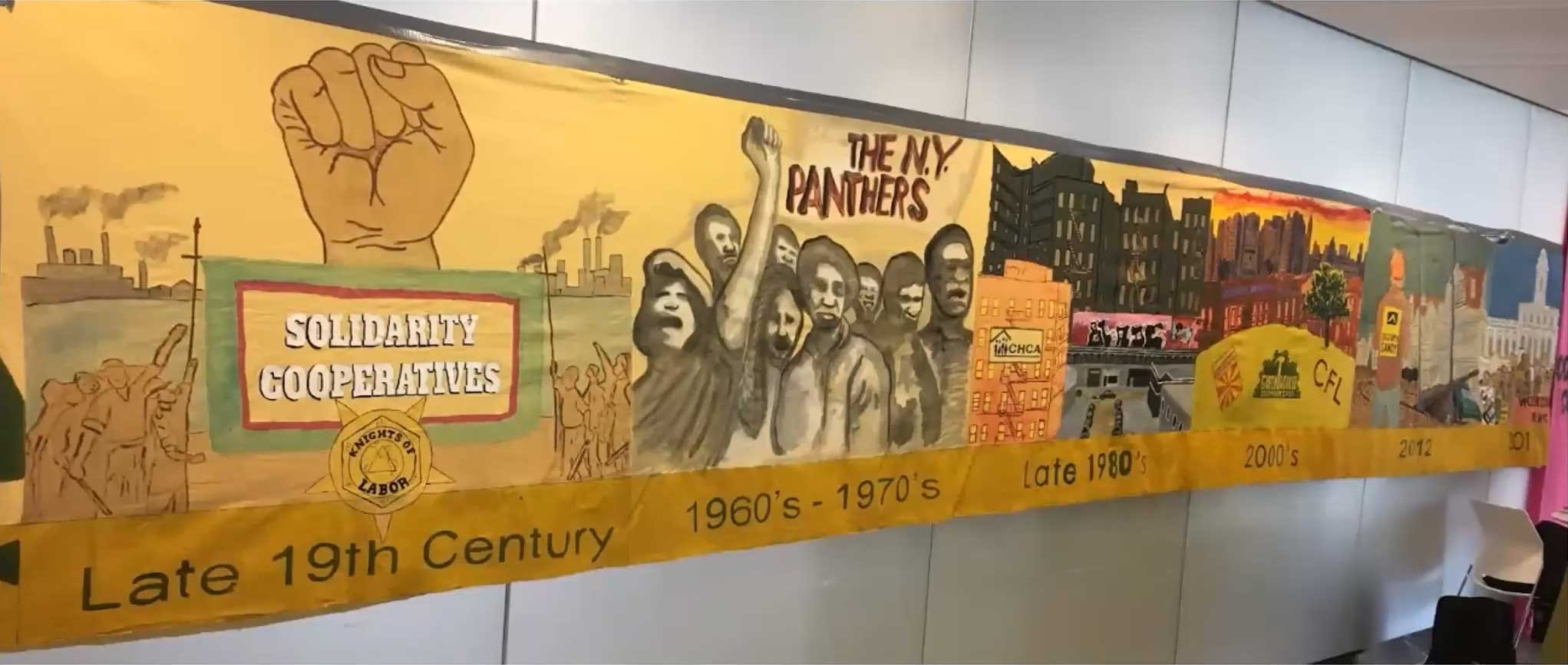Author: Rob Persons, SLU MA student
The economy doesn’t work for the vast majority of people. Wages are low, costs are high, and employers treat workers like replaceable cogs. The system needs to be changed, but mainstream politics doesn’t seem up to the task. Where will the change come from?
Right now, real change is being made in the movement for worker-owned cooperatives. By owning the workplace itself, workers participate democratically in management, ensuring living wages and dignity. While there may be nothing revolutionary about a few isolated coops, there is a growing movement to connect existing coops and seed new ones into a mutually reenforcing network. This network is sometimes called the ‘solidarity economy’ as it is based on values like solidarity, reciprocity and sustainability, instead of profit and greed. While wealth and power is increasingly concentrated in a few hands, the worker-owned cooperative movement draws its strength in numbers and networks in cooperation in order to fight back.
At the end of the Spring term, 2023 students in the a course with the advanced certificate in Workplace Democracy and Community Ownership (WDCO) at the CUNY School of Labor and Urban Studies heard from leaders in this grassroots solidarity economy movement. In twelve minute segments, six speakers from across North America share how they are building regional ecosystems of worker-owned cooperatives with the explicit intention of creating an economic system that works for all people and the planet. This “Co-op Any Town” event was part of the Cooperative Management for a Changing World class taught by Professor Rebecca Lurie, the founding director of CWOP.
Hear about some of the most exciting networks growing across the US and Canada:
Rebecca Lurie – 0:54 – Professor Rebecca Lurie is the founding director of the Community and Worker Ownership Project at CUNY SLU. Rebecca sets the tone for the evening with a land acknowledgement and provides background on CWOP, CUNY SLU, and cooperative systems.
David Cobb – 9:06 – is an employee of the Wyiot Tribe and Co-Coordinator of the US Solidarity Economy Network. In his presentation, David explains why he is a revolutionary fighting to remake social, economic and political institutions. David is facilitating land back efforts using the Community Land Trust (CLT) model and it is working. The Wyiot Tribe has built dozens of affordable housing units and have many more exciting projects in the works. See David’s presentation at the Co-op Any Town event hosted by the Community Worker Ownership Program at CUNY SLU.
Michelle Eddleman McCormick – 19:28 – of Cooperation Vermont discusses the formation of Co-op VT and its relationship to Cooperation Jackson and other networks. Michelle discusses climate change, land resilience and bioregional conditions. From this background, Michelle grounds Cooperation Vermont’s mission and describes the emergence of the worker-owned General Store in rural Vermont.
Cherrelle Gardner- 30:18 – is the program director of Co-op Dayton, a non-profit developing cooperative businesses in Dayton, OH to promote local benefit and wealth building opportunities for Black and working class communities. Cherrelle discusses the hardships Dayton faced when conventional businesses divested from Dayton since the owners who did not have a stake in the community prioritized greed and profit. Worker-owned cooperatives are a solution to this problem because worker owners are committed to making a local economy and that works for the community.
Jonny Sopotiuk – 50:38 – is the managing director of the Vancouver Union Coop Initiative. Formed to help artists access fair rates for their creative work, Vancouver UCI has incubated 15 cooperatives across several industries. Jonny discusses the history of union coops and how the research by Rebecca Lurie at CUNY SLU helped Vancouver UCI access $2 million in public funding.
Evan Casper-Futterman – is the Senior Director of Education and Planning at the Bronx Cooperative Development Initiative (BCDI). Evan talks about the long history of co-ops in the Bronx as a tool for working class empowerment and economic democracy. BCDI has formed partnerships with organizations across the Bronx to promote an economy that puts collective ownership and community well-being over profit.
Haley Roeser – 40:15 – is part of LA for All, an organization engaged in municpalist organizing in Los Angeles. Haley provides a background on radical municipalism as a political framework and how it inspires the work of LA for All. Haley discusses why grassroots democracy is both a means and ends to achieve a more just society.
Next Spring we aim to include Project Champions in many of our sessions, bringin the filed to the classroom with deep intentions to learn from experiences and grow the Solidarity Economy anywhere we may go.




